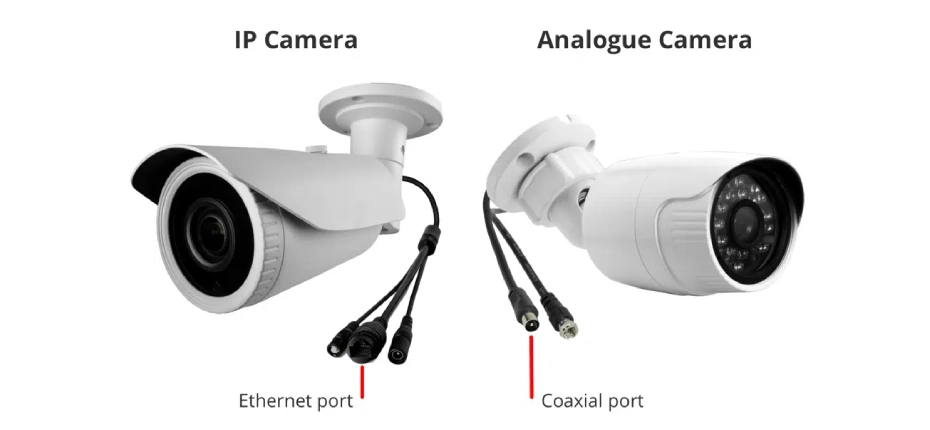The Evolution of CCTV: From Analog to IP Cameras
Closed-circuit television (CCTV) has significantly evolved since its early days. Initially, these systems relied on analog technology, which offered a straightforward way to monitor and record activities. Analog systems were simple and reliable but had limitations in image quality and scalability. With the introduction of IP (Internet Protocol) cameras, the field has been transformed. These digital systems provide superior image quality, greater scalability, and easier accessibility, revolutionizing how surveillance is conducted. Understanding this transition is crucial for anyone involved in CCTV installation services in Dubai, as it highlights the advancements in technology and the benefits of upgrading to modern systems. This knowledge helps make informed decisions about surveillance solutions, ensuring optimal security and efficiency.

Analog CCTV Cameras
Analog CCTV systems were the pioneers in surveillance technology, gaining popularity in the late 20th century. These systems provided a simple and effective way to monitor and record activities, making them a staple in security setups worldwide. Known for their straightforward operation and reliability, analog cameras have been the go-to solution for many years. However, they come with several limitations, such as lower resolution compared to digital cameras, which affects the clarity and detail of the footage. Connectivity is another drawback, as these systems typically require direct cable connections, which can be cumbersome and restrictive, especially in larger installations.
Many existing systems still use analog technology due to their initial investment but face compatibility issues as newer technologies emerge. Upgrading to digital can be challenging because of the existing analog infrastructure, often requiring either a complete overhaul or hybrid solutions that integrate both analog and digital components. Understanding these legacy systems and their limitations is crucial for anyone considering CCTV camera installation. Knowing when and how to transition from analog to digital systems as the technology landscape evolves can ensure better performance, scalability, and future-proofing of surveillance setups.
Digital Transition: Introduction of IP Cameras
The shift to digital technology brought the emergence of IP (Internet Protocol) cameras, transforming how surveillance systems operate. Unlike their analog counterparts, IP cameras use the internet for data transmission, significantly improving various aspects of CCTV systems. These advancements have made surveillance more efficient and accessible, marking a new era in security technology. IP cameras offers several benefits that make them a preferred choice for modern surveillance needs.
One of the main features of IP cameras is their higher resolution, which provides clearer and more detailed images. This enhancement is crucial for accurately identifying individuals and incidents. Additionally, IP cameras allow for remote access, enabling users to monitor their systems from anywhere with an internet connection. This feature particularly benefits those seeking CCTV installation companies in Dubai, as it offers flexibility and convenience. Scalability is another major advantage; adding more cameras to an IP system is straightforward and doesn’t require extensive new cabling. IP cameras also integrate seamlessly with existing network infrastructure, making them easier to install and manage. This integration allows for more flexible and scalable surveillance solutions, leveraging other network resources for improved functionality and efficiency.
Comparison: Analog vs. IP Cameras
When considering CCTV camera installation, it’s evident that IP cameras offer significant advantages over analog systems, particularly in quality and convenience. Here’s a closer look at why IP cameras are the superior choice:
- Image Quality: IP cameras excel in resolution, clarity, and colour fidelity compared to analog systems. The higher resolution of IP cameras ensures better detail, which is crucial for accurately identifying individuals and incidents.
- Scalability and Flexibility: IP systems are much more scalable and flexible. Adding new cameras to an IP network is simple and doesn’t require extensive additional infrastructure. This ease of expansion allows the system to adapt as needs change, making it a versatile solution for various settings.
- Remote Access and Monitoring:The ability to access IP cameras remotely is one of their strongest advantages. Users can monitor their CCTV systems from any location with internet connectivity, offering unparalleled flexibility and control over surveillance operations. This feature is particularly beneficial for those who need constant access and monitoring capabilities.
Advanced Features of IP Cameras
When seeking the best CCTV installation companies in Dubai, it’s essential to understand the advanced features modern IP cameras offer. These features not only boost security but also provide valuable insights and seamless integration with other systems. Here’s why IP cameras are a smart choice:
- Analytics and Intelligent Video: Modern IP cameras have sophisticated analytics and intelligent video capabilities. Features like motion detection, facial recognition, and object tracking significantly enhance security and provide valuable insights, making surveillance more effective and proactive.
- Enhanced Security: IP cameras offer robust security features such as encryption, authentication, and tamper detection. These advanced measures help protect the integrity of the surveillance system, ensuring that data remains secure and tamper-free.
- Integration with Other Systems: IP cameras can work smoothly with other security systems, such as access control and alarm systems. This compatibility enables a comprehensive security solution, which improves overall safety and operational efficiency.
Cost Considerations and Return on Investment (ROI)
When researching CCTV installation providers, it is critical to evaluate both the upfront cost and the long-term savings of IP systems over analogue systems. Here’s what you need to know:
- Initial Investment: The initial investment for IP systems can be higher than for analog systems, but the enhanced performance and features of IP cameras often justify this cost. These advanced systems provide better image quality, greater flexibility, and a range of modern capabilities, making them a worthwhile investment.
- Long-Term Savings: Over time, IP systems can lead to significant savings. They require less maintenance, offer enhanced scalability, and are designed to be future-proof. This means that, while the initial cost may be higher, IP cameras are a more cost-effective long-term option due to lower maintenance costs and the ability to readily expand and integrate new technologies.
Case Studies and Real-World Applications
When choosing CCTV installation companies in Dubai, it’s important to consider how IP camera systems benefit both commercial and residential sectors. Industries like retail, transportation, healthcare, and manufacturing rely heavily on these advanced systems for their reliable and scalable surveillance solutions, ensuring safety and security. IP cameras provide the high-quality monitoring needed to protect assets and maintain smooth operations in these environments.
IP cameras offer significant improvements in home security and surveillance for residential and small business installations.They are easy to install, offer remote monitoring, and work perfectly with other smart home devices to improve overall security and convenience.
Consider the case of Ms. Layla, a small business owner in Dubai. She needed a robust surveillance system to protect her boutique and monitor customer flow. After consulting with a top CCTV installation company in Dubai, she opted for an IP camera system. This choice allowed her to enjoy high-resolution footage, easy scalability, and the ability to check on her store remotely via her smartphone. Additionally, the system integrated with her existing smart home devices, providing a comprehensive security solution that gave her peace of mind at work and home.
Future Trends and Innovations
The future of CCTV technology is promising, especially with advancements in video analytics powered by artificial intelligence and machine learning. These technologies are making IP cameras smarter and more proactive, enhancing their ability to detect and respond to potential security threats. AI-driven analytics can identify unusual activities, recognize faces, and track objects more efficiently, providing a higher level of surveillance.
Additionally, integrating IP cameras with IoT (Internet of Things) initiatives is transforming how we approach security in smart homes and smart cities. This connectivity allows for more seamless and efficient surveillance systems, enhancing overall security and convenience. By integrating with other smart devices, IP cameras create a more connected and responsive environment, benefiting individual homeowners and larger urban settings. These advancements make modern IP camera systems an increasingly attractive option for those looking for CCTV camera installation.
Conclusion
The evolution of CCTV technology from analog to IP cameras has revolutionized surveillance, offering numerous benefits like improved image quality, greater scalability, and convenient remote access. Upgrading to IP camera systems provides long-term advantages, ensuring your surveillance setup remains effective and adaptable to future needs. Embracing these advancements is crucial for maintaining robust security solutions, as staying updated with the latest technological developments ensures you get the most out of your investment. Whether it’s for enhancing security at home or for a business, keeping pace with these innovations will help you stay ahead and secure.







